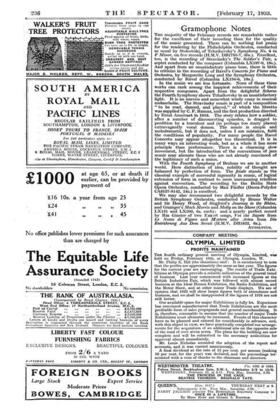Gramophone Notes
Tan majority of the February records are remarkable rather for the excellence of their recording than for the quality of the • music presented. There can be nothing but praise for the rendering by the Philadelphia Orchestra conducted as usual by Stokowski, of Tchaikovsky's Symphony No. 4 in F Minor, on five recorcis (H.M.V. DB1793-7, 30s.). Excellent, too, is the recording of Stravinsky's The Soldier's Tale, a septet conducted by the composer (Columbia LX197-9, 185.). And apart from an unsatisfactory piano tone, there is little to criticize in the recording of Ravel's Concerto for Piano and Orchestra, by Marguerite Long and the Symphony Orchestra, conducted by Ravel (Columbia LX194-8, 181.). • In the music we are less fortunate. None of these three works can rank among the happiest achievements of their respective composers. Apart from the delightful Scherzo the Fourth Symphony shows Tchaikovsky in an unsatisfactory light. It is an uneven and somewhat windy essay in musical melancholia. The Stravinsky music is part of a composition " to be read, danced, and played," of which the libretto was supplied by C. F. Ramuz, and the first production directed by Ernst Ansermet in 1918. The story -relates how a soldier, after a number of disconcerting episodes, is dragged to perdition by a truculent and (in perhaps too thany places) extravagantly vocal demon. The music is simple and melodramatic, but it does not, unless I am mistaken, fulfil the conditions of popularity. For many. people . the Ravel Concerto may appear altogether too theoretical. It is in many ways an interesting work, but as a whole it has more principle than performance. There is a charming slow movement, but the introduction of .the conventions of jazz music may alienate those who are not already convinced of the legitimacy of such a union.
With the Fourth Symphony of Brahms we are in another world. Here distinction of idea, nobility of thought are balanced by perfection of form. The finale stands as the classical example of successful ingenuity in music, of logical extension of form in contrast to mere unreasoning rebellion against convention. The recording by the Berlin State Opera Orchestra conducted by Max Fiedler (Decca-Polydor CA8187-8142, 24.) is excellent.
We may also recommend two delightful records by the British Symphony Orchestra, conducted by Bruno Walter and Sir Henry Wood, of Siegfried's Journey, to the Rhine, and Grainger's Mock Morris and Molly on the-Shore (Columbia LX191 and LX200, Os. each) ; and a nearly perfect record by Ria Ginster of two Moz-irt songs, Vet eke Sapete from Le Nome di F igaro and Martens alter Arlen from Die Entrithrung Atm Dens Serail (H.M.V. D111832, 8s.).
Airrororcus.






































 Previous page
Previous page